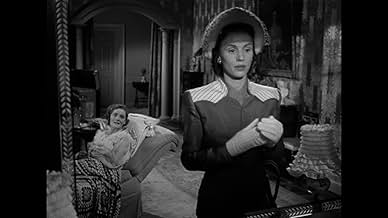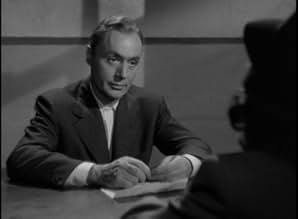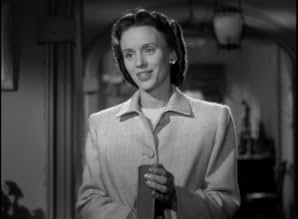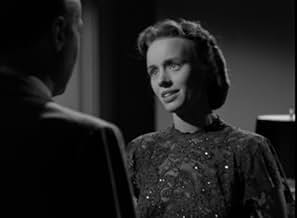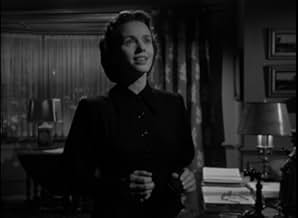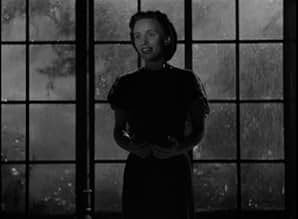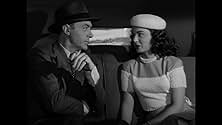IMDb RATING
6.8/10
1K
YOUR RATING
A cheating husband is charged in the poisoning death of his invalid wife, in spite of other women and suicide also being suspected.A cheating husband is charged in the poisoning death of his invalid wife, in spite of other women and suicide also being suspected.A cheating husband is charged in the poisoning death of his invalid wife, in spite of other women and suicide also being suspected.
- Awards
- 3 wins total
Patrick Aherne
- Warder
- (uncredited)
Mari Aldon
- Girl
- (uncredited)
Wilson Benge
- Clerk
- (uncredited)
Lydia Bilbrook
- Mrs. Fellows
- (uncredited)
Featured reviews
The obvious movie title here rather negates the initial whodunit mystery of who really killed, if indeed she was killed, the troubled invalid wife, Rachel Kempson, of philandering country gentleman, Charles Boyer. It could have been suicide, maybe it was the wife's devoted but jealous, approaching middle-age friend Jessica Tandy or even the waspish nurse Mildred Gatwick but soon enough the fickle finger of blame points squarely at Boyer, who we learn, has motives for murder coming out of his ears. Firstly, he plainly doesn't love his wife, secondly, he's cutting about with his adoring teenage lover, soon-enough his wife, Ann Blyth and thirdly he's just taken out a large death policy on his wife's life.
And die she does, of poisoning, which naturally brings Boyer a world of trouble as he is charged with and goes on trial for his wife's murder. We learn that Tandy carries a bigger torch than Lady Liberty for Boyer and see him reject her advances which certainly lines her up as a woman of vengeance from where I'm sitting. The accused has only one real ally, although considering the help he offers Boyer, we should all have the family doctor, Cedric Hardwicke on our side.
Anyway, I'll leave the plot hanging there lest I give too much away. Unsurprisingly, given the film was adapted from a play of the celebrated novelist Aldous Huxley who also contributed to the screenplay, there are screeds of heavy dialogue with little in the way of backgound music to influence the viewer's perceptions one way or the other. Some of this dialogue is quite weighty and intense but it just as often flounders into unnatural bombast
Director Zoltan Korda steps politely over and around some of the stickier plot-points and unlikely and sometimes fast-changing characterisations. Boyer is good as the love-him-or-hate-him central character, Tandy is even better as the spurned sinister spinster while Hardwicke is solid as the doc who literally clocks what's going on.
Although it's all highly unlikely, I was nonetheless carried along by the sometimes improbable events depicted. Characters exchange a lot of often expository dialogue as the narrative grinds ever further forward and I liked the surprising and unconventional ending with the viewer left to the job of tying up the loose ends by themselves.
An unusual but far from uninteresting and uninvolving feature.
And die she does, of poisoning, which naturally brings Boyer a world of trouble as he is charged with and goes on trial for his wife's murder. We learn that Tandy carries a bigger torch than Lady Liberty for Boyer and see him reject her advances which certainly lines her up as a woman of vengeance from where I'm sitting. The accused has only one real ally, although considering the help he offers Boyer, we should all have the family doctor, Cedric Hardwicke on our side.
Anyway, I'll leave the plot hanging there lest I give too much away. Unsurprisingly, given the film was adapted from a play of the celebrated novelist Aldous Huxley who also contributed to the screenplay, there are screeds of heavy dialogue with little in the way of backgound music to influence the viewer's perceptions one way or the other. Some of this dialogue is quite weighty and intense but it just as often flounders into unnatural bombast
Director Zoltan Korda steps politely over and around some of the stickier plot-points and unlikely and sometimes fast-changing characterisations. Boyer is good as the love-him-or-hate-him central character, Tandy is even better as the spurned sinister spinster while Hardwicke is solid as the doc who literally clocks what's going on.
Although it's all highly unlikely, I was nonetheless carried along by the sometimes improbable events depicted. Characters exchange a lot of often expository dialogue as the narrative grinds ever further forward and I liked the surprising and unconventional ending with the viewer left to the job of tying up the loose ends by themselves.
An unusual but far from uninteresting and uninvolving feature.
Henry Maurier (Boyer) is an arrogant wealthy Englishman married to Emily who is both sickly and shrewish. Doris (Blyth) is his much younger mistress. The Maurier's also have a woman friend named Janet Spence (Tandy) who has always loved Maurier. When Emily is poisoned, suspicion falls on Henry and there is a great deal of circumstantial evidence against him. The script, by Aldous Huxley, is extremely literate and the movie is a pleasure to watch. Courtroom fans will also enjoy the capably executed inquest and trial scenes.
The very annoying Emily (Rachel Kempson) is not in good health. Thankfully, she dies. However, her death is treated suspiciously and number one suspect is husband Henry (Charles Boyer). He doesn't help matters by immediately marrying 18 year old Doris (Ann Blyth) who he has been having an affair with for a few months.
This film has a good cast, especially Jessica Tandy as Henry's friend "Janet", Cedric Hardwick as "Dr Libbard" and Mildred Natwick as "Nurse Braddock". Boyer is good but Blyth is very irritating in a Shirley Temple kind of way. The film drags whenever she is on screen.
The film has many good scenes, eg, when Janet and Henry are in the house sheltering from a violent storm - the use of German Expressionism in this scene (the use of darkness and lightning) will tell you all you need to know. Similarly, another good scene is when Janet visits Henry the day before his execution (the way the scene is framed will stick in your mind). And the scenes between Janet and Dr Libbard towards the end of the film are crammed with tension. I found that the film also had a particularly good moment of philosophical dialogue when Henry verbalized his acceptance of death to Doris.
You will, no doubt, guess who the guilty party is from the beginning but it's still a good film to watch again.
This film has a good cast, especially Jessica Tandy as Henry's friend "Janet", Cedric Hardwick as "Dr Libbard" and Mildred Natwick as "Nurse Braddock". Boyer is good but Blyth is very irritating in a Shirley Temple kind of way. The film drags whenever she is on screen.
The film has many good scenes, eg, when Janet and Henry are in the house sheltering from a violent storm - the use of German Expressionism in this scene (the use of darkness and lightning) will tell you all you need to know. Similarly, another good scene is when Janet visits Henry the day before his execution (the way the scene is framed will stick in your mind). And the scenes between Janet and Dr Libbard towards the end of the film are crammed with tension. I found that the film also had a particularly good moment of philosophical dialogue when Henry verbalized his acceptance of death to Doris.
You will, no doubt, guess who the guilty party is from the beginning but it's still a good film to watch again.
An excellent psychological thriller , based on Aldous Huxley's novella (adapted by himself,but the Mona Lisa title was better than that of the film) , with a stellar cast .
Although "Rebecca " was written after Huxley's work , there are shades of Du Maurier's tale : "I feel she's still here" ;in the movie, (like in real life),Boyer is French : il s'appelle Maurier ici ! The scene of the thunder over the house is a great moment to rival the best of Gothic horror movies ;and it' not gratuitous for it comes back in the extraordinary final Boyer/Tandy confrontation which makes your hair stand on end ;the way both are filmed (she seems to be an exterminating angel watching him in Hell) is stunning. In my book ,Tandy steals the show from Blyth .
This "beyond the grave" vengeance will remind you of Stahl's "leave her to heaven " (1946); it's a must for Gothic melodramas buffs.
Although "Rebecca " was written after Huxley's work , there are shades of Du Maurier's tale : "I feel she's still here" ;in the movie, (like in real life),Boyer is French : il s'appelle Maurier ici ! The scene of the thunder over the house is a great moment to rival the best of Gothic horror movies ;and it' not gratuitous for it comes back in the extraordinary final Boyer/Tandy confrontation which makes your hair stand on end ;the way both are filmed (she seems to be an exterminating angel watching him in Hell) is stunning. In my book ,Tandy steals the show from Blyth .
This "beyond the grave" vengeance will remind you of Stahl's "leave her to heaven " (1946); it's a must for Gothic melodramas buffs.
This film noir gem spins the tale of romance, unrequited love and revenge that conspire to frustrate a spinster in her pursuit of a man. The romance involves the man's dalliances with an attractive girl and the unrequited love is the bitter fruit of the spinster's quest to capture the man for herself. The revenge plays out its part in due course as the triangle emerges with malevolent undercurrents taking shape. The cast is excellent, especially Jessica Tandy and Sir Cedric Hardwicke, with Charles Boyer caught in the middle by the eager, determined females. Ann Blyth marries her suave suitor and sets in motion the cold fury of the spurned woman who can only watch as her dreams of happiness are dashed. The black and white camera work has a brooding quality and gives the film a classic film noir look.
Did you know
- TriviaHenry Maurier quotes from Wordsworth's 'Ode to Duty' (published 1807): "Stern daughter of the Voice of God"
- GoofsAlthough Emily's gravestone and numerous newspaper articles establish the time of the story as 1931 all the women's hair styles, clothing, and overall demeanor are strictly 1947.
- Quotes
General Spence: Wouldn't have minded being a dog myself. Comfortable kennels, free meals, unlimited access to the females of the species, and when you're old, they shoot you. No wheelchairs, no torture, no blasted nurses - one bang and it's over.
- ConnectionsReferenced in Actors Studio: Martin Scorsese (2002)
- How long is A Woman's Vengeance?Powered by Alexa
Details
- Release date
- Country of origin
- Official sites
- Languages
- Also known as
- A Woman's Vengeance
- Filming locations
- Production company
- See more company credits at IMDbPro
- Runtime
- 1h 36m(96 min)
- Color
- Aspect ratio
- 1.37 : 1
Contribute to this page
Suggest an edit or add missing content

